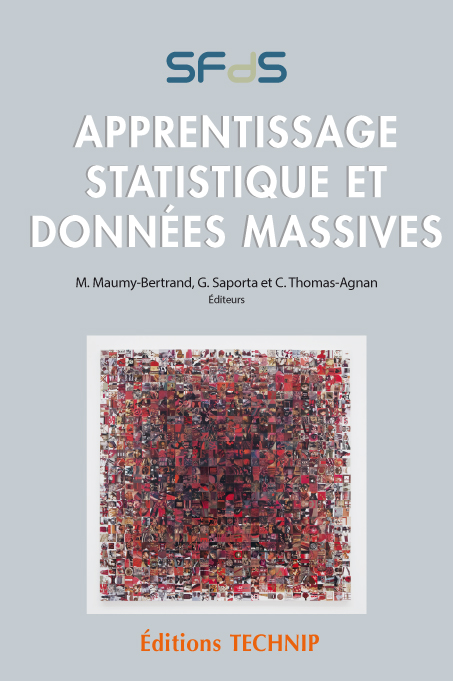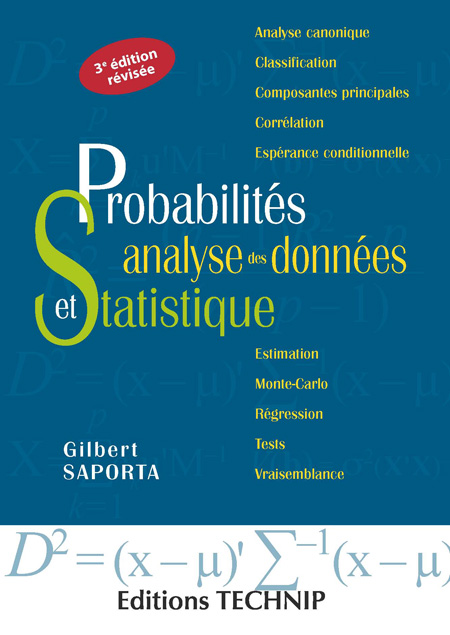  |
|
Keynote presentation in variable clustering. Gilbert SAPORTA* is emeritus professor of applied statistics at the Conservatoire National des Arts et Métiers, in Paris. He is a well-known French statistician whose main contributions focus on the:
Gilbert has more than 300 publications amongst articles, chapters, and books. For a list of his publications click here. Some of his most well-known books are: |
|
His talk will be about clustering of variables, and is a collaboration with Ndèye Niang (Cnam, Paris, France); and Mory Ouattara (Université San Pedro, Côte d'Ivoire). Anne HASTED* has had an extensive career as an applied statistician, initially as an academic statistician at Reading University UK and then for 30 years building up and running Qi Statistics, a consultancy company, which offers statistical training, data analysis and consultancy support to research and industry. She now has a more relaxed role as “senior consultant to the company. Anne has extensive training and consultancy experience in manufacturing, product development and market research and has an international reputation for “user friendly” training. Anne has a good number of publications amongst articles, chapters, and books. For a list of his publications click here. |
| |
Alexiane LUC* is a statistical consultant at IT&M Stats, at the Research and Innovation Centre of L’Oreal in Paris. She received her PhD thesis in applied statistics from ONIRIS, in partnership with Strategir, and l'Institut Agro Rennes-Angers. Her thesis focused on the “Evaluation of consumer perception using the Free JAR sensory protocol: a new methodology for data collection and statistical analysis”. Alexiane will be presenting about the developement of a machine learning method to analyze free JAR data. Her method is grounded on the fact that Free JAR data can be seen as labeled textual data, since a hedonic category is associated to each Free JAR comment. For more details about Alexiane clik here. |
Yvonnick Noël* is professor in Psychology and Statistics at Université Rennes 2, France. His research in the field of psychometrics is focused on Item Response Theory, in which he developed a new family of response model for continuous bounded responses (Beta Response Models). He tries to derive response models, for preference or behavior data, from an analysis of the dynamic interplay between latent forces, expressed as an explicit differential equation model, in an approach inspired from physics. He is the author of the book Psychologie statistique avec R." Some of his most well-known books are: Yvonnick key presentation will be "On the importance of specifying an explicit response function in behavior and preference measurement" Michael Greenacre* is Senior Talent Professor of Statistics at the Universitat Pompeu Fabra in Barcelona. He was one of the very few English-speaking students of Jean-Paul Benzécri, and he completed his doctorate in 1978 at Benzécri’s Institut de Statistique at the Université de Paris 6. He went on to publish Theory and Applications of Correspondence Analysis (Academic Press, 1984), which has almost 6000 citations on Google Scholar. Apart from his interest in correspondence analysis, about 23 years ago he also turned to the related field of compositional data analysis after meeting and collaborating with both John Aitchison and Paul Lewi, the pioneers of the subject. He has worked in many applied fields, mainly in Arctic ecology, and recently in biochemistry, geochemistry and microbiome research. He is also an accomplished musician and quite well-known for his YouTube channel youtube.com/StatisticalSongs, with more than 600 subscribers. He has written over 100 research articles in international refereed journals and many books, the most important ones being:
Michael presentation will be "Compositional data analysis and the connection to correspondence analysis, with applications to biochemical compositional data from fish and shellfish". *Note: All biographies provided by the authors. |
|

